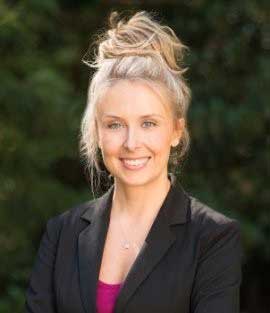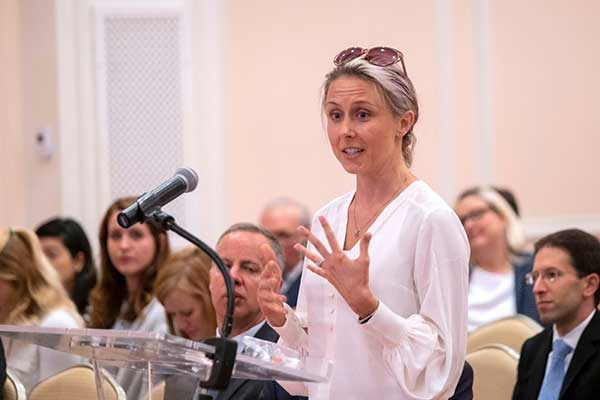By Orla Kilpatrick
She left her mark at the Collaboratory, having been an influential member in growing the program into what it has become today. “My time at the Collaboratory was very influential in dictating where my career trajectory went,” said Grzebyk.

Finding a Passion for Research
After completing her graduate degree in Poland, she realized a PhD in academia, leading into the role of a professor, was not quite right for her. However, her interest in research was still strong. Her mission was to find a way for her research to be impactful, display meaning and hold value beyond the lab bench and books. Her answer was science and environmental policy.
So, she did as every great researcher does and spent six months couch-surfing in Australia. Her time there was short but memorable. After working in surf shops, volunteering at research institutes and traveling, Grzebyk found herself in Cambodia, where she found her passion.
In Southeast Asia, Grzebyk volunteered at a water quality analysis lab focusing on the intersection of water quality and engineering, which would later become her field at UNC-Chapel Hill.
Connecting Science and Policy
During her time at Carolina, Grzebyk was interested in understanding how environmental research could have an impact on policy and was instrumental in founding a science policy group. The group began with six members and was called the Triangle Alliance for Environmental Policy.
“It was an effort among two graduate students at UNC, me and a former lab friend of mine, two at Duke University, and two at NC State University. The whole idea was to develop training programs across the Triangle for anyone that wanted to join… It was open to anybody interested in learning how to advocate for their research or their work in the sciences or engineering field.”
The group soon grew to encompass dozens of graduate students across the three universities with regular meetings and workshops focused on science policy topics.
It was at one of these meetings where she met the executive director of the NC Collaboratory, Jeff Warren.
The Collaboratory had just established a Graduate Research Assistant position to help support its projects. Warren said, “we got a one-time research assistant position offered to us that would split expenses with the graduate school. Right about this time, Kasia came in and presented to us, and she was amazing. She was into science policy, well-spoken, and was on campus getting her PhD in a professor’s lab that we already funded. We didn’t even announce the position. We just reached out to her. It was a no-brainer.”
Harnessing Environmental Research for Impact
For state governments to make informed decisions, they need facts to make impactful, data-driven, backed decisions. Grzebyk saw the program’s potential. Researchers need money, and governments need data. Here she could focus on policy and extend her research outside the laboratory.
“It was the perfect opportunity for science and research communication to develop and meet the needs of the state government”, stated Grzebyk.
The whole organization was built around the concept of collaboration. Warren and the Collaboratory would act as a connector between universities that were generating the data and state legislators that needed the data.
Warren reflected on the role that Grzebyk played in supporting the Collaboratory in this new role. “Kasia helped us figure a lot of things out with the new model; a lot of people were skeptical or hadn’t heard about the program. But once it gained steam, everybody was so supportive.”
Grzebyk’s first project was for the shellfish mariculture advisory committee, a very herculean effort. This business in North Carolina used to thrive, but after sharply declining, it was Grzebyk’s job to make something from it again through efforts of cross-collaboration. She summarized her role, “we looked at issues from a variety of positions, from a business perspective, a marketing perspective, a scientific perspective, and a logical perspective.”

The committee went on to write a report that they submitted to the North Carolina General Assembly. The information went on to be used to enact legislation creating new policies and funding programs for shellfish mariculture in North Carolina.
Another one of Grzebyk’s main projects at the Collaboratory was studying PFAS. Taking on both roles of administrator and researcher, she came to understand how both roles positively impacted each other. She worked on developing and optimizing membranes for PFAS removal. Grzebyk said, “my passion was found and developed in North Carolina. Everything that North Carolina has in respect to PAFS has an important place in my heart… I hold environmental science and policy at equal levels of importance because I’ll always be a scientist by training, but the role of policy really is the connector.”
Reflecting on the Carolina Experience
The skills Grzebyk developed at UNC-Chapel Hill and the Collaboratory allowed her to make an immediate impact in the private sector. She began her career at Exponent where she worked as a consultant for almost three years. At Exponent, she worked in environmental practice on many environmental contamination-related projects. She advised clients on best environmental practices and implemented a regulation tracking process to monitor PFAS developments and follow national regulations.

Now Grzebyk is the Environmental Policy Program Manager of Amazon Web Services (AWS), looking at policy not only stateside but globally. Her main goal right now is to build up the relatively new program and implement the lofty goals that Amazon has set concerning sustainability.
“I really enjoy being in the position that I’m in. I get to exercise all the skills I have developed and exercise my creativity while envisioning where we want this team to go. I would not have been able to land this position without the experience that I had at the Collaboratory.”
For Grzebyk, communication is key. Being able to communicate challenging concepts to different audiences is crucial to her position.
“To my younger self: keep an open mind in respect to what I can do with the degree and trajectory I was taking. I think that I am really proud of former Kasia for all the opportunities that I have embraced and looked into while at UNC. As a grad student, you have a wealth of resources available to you at a university like UNC.”
“Maybe I would have graduated sooner if I hadn’t done so much, but I wouldn’t change one thing. I really enjoyed all the science and communication and policy work that I did at UNC in conjunction with my research. Follow your intuition; this is ultimately why I am where I am today.”
Orla Kilpatrick (Hometown: Melbourne, Australia) is a senior Media Communications and Cultural studies major at UNC-Chapel Hill and is working as a communications intern with the North Carolina Collaboratory for the 2023 spring semester.
